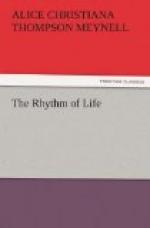For if every language be a school, more significantly and more educatively is a part of a language a school to him who chooses that part. Few languages offer the choice. The fact that a choice is made implies the results and fruits of a decision. The French author is without these. They are of all the heritages of the English writer the most important. He receives a language of dual derivation. He may submit himself to either University, whither he will take his impulse and his character, where he will leave their influence, and whence he will accept their education. The Frenchman has certainly a style to develop within definite limits; but he does not subject himself to suggestions tending mainly hitherwards or thitherwards, to currents of various race within one literature. Such a choice of subjection is the singular opportunity of the Englishman. I do not mean to ignore the necessary mingling. Happily that mingling has been done once for all for us all. Nay, one of the most charming things that a master of English can achieve is the repayment of the united teaching by linking their results so exquisitely in his own practice, that words of the two schools are made to meet each other with a surprise and delight that shall prove them at once gayer strangers, and sweeter companions, than the world knew they were. Nevertheless there remains the liberty of choice as to which school of words shall have the place of honour in the great and sensitive moments of an author’s style: which school shall be used for conspicuousness, and which for multitudinous service. And the choice being open, the perturbation of the pulses and impulses of so many hearts quickened in thought and feeling in this day suggests to me a deliberate return to the recollectedness of the more tranquil language. ’Doubtless there is a place of peace.’
A place of peace, not of indifference. It is impossible not to charge some of the moralists of the last century with an indifference into which they educated their platitudes and into which their platitudes educated them. Addison thus gave and took, until he was almost incapable of coming within arm’s-length of a real or spiritual emotion. There is no knowing to what distance the removal of the ‘appropriate sentiment’ from the central soul might have attained but for the change and renewal in language, which came when it was needed. Addison had assuredly removed eternity far from the apprehension of the soul when his Cato hailed the ‘pleasing hope,’ the ‘fond desire;’ and the touch of war was distant from him who conceived his ‘repulsed battalions’ and his ‘doubtful battle.’ What came afterwards, when simplicity and nearness were restored once more, was doubtless journeyman’s work at times. Men were too eager to go into the workshop of language. There were unreasonable raptures over the mere making of common words. ’A hand-shoe! a finger-hat! a foreword! Beautiful!’ they cried; and for the love of German




